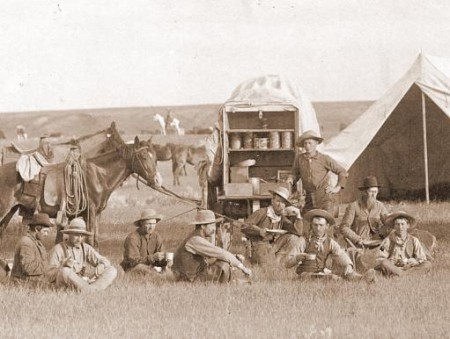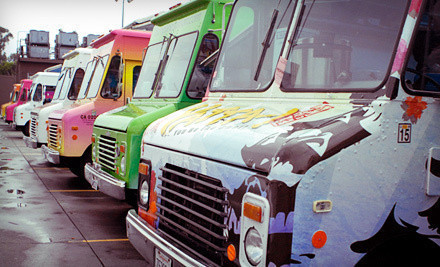Food trucks have a very rich and storied history. The need for cattle ranchers to be able to feed their workers is really where this whole phenomenon started. The year was 1866 and The Civil War had ended.
Wikipedia helps to fill in some of the early details for the start of food trucks: After the American Civil War, there was a mass expansion to move westward. Innovative cattlemen needed to herd cattle to parts of the country that did not have railroads which would mean they would be on the road for months at a time.[5] The need to feed these cattlemen resulted in the creation of the chuck wagon. The origin of the chuck wagon or food truck stems from the “father of the Texas Panhandle,” Charles Goodnight. In 1866, Goodnight, a cattle herder, realized how difficult it was to cook proper meals during cattle drives. With that, he took a sturdy old United States Army wagon and constructed interior shelving and drawers. He then stocked the wagon with tableware and utensils, spices and medical supplies, including Castor oil and quinine. Heavy pots and pans were stashed on the lower shelves while the food was kept in the bed of the wagon. Food consisted of dried beans, coffee, cornmeal, and other easy to preserve foodstuffs. There was no fresh fruit, vegetables, or eggs available and the meat was not fresh unless an animal was injured during the run and therefore had to be killed. The meat they ate was greasy cloth-wrapped bacon, salt pork, and beef, usually dried or salted or smoked. The wagon was also stocked with a water barrel and a sling to kindle wood to heat and cook food and so the chuck wagon was created.[7] By the 1890s, night lunch wagons, which catered to night-time workers, were a common sight in big cities like New York City and the food truck movement has been growing and rolling around our nation’s streets ever since.
The origin of the chuck wagon or food truck stems from the “father of the Texas Panhandle,” Charles Goodnight. In 1866, Goodnight, a cattle herder, realized how difficult it was to cook proper meals during cattle drives. With that, he took a sturdy old United States Army wagon and constructed interior shelving and drawers. He then stocked the wagon with tableware and utensils, spices and medical supplies, including Castor oil and quinine. Heavy pots and pans were stashed on the lower shelves while the food was kept in the bed of the wagon. Food consisted of dried beans, coffee, cornmeal, and other easy to preserve foodstuffs. There was no fresh fruit, vegetables, or eggs available and the meat was not fresh unless an animal was injured during the run and therefore had to be killed. The meat they ate was greasy cloth-wrapped bacon, salt pork, and beef, usually dried or salted or smoked. The wagon was also stocked with a water barrel and a sling to kindle wood to heat and cook food and so the chuck wagon was created.[7] By the 1890s, night lunch wagons, which catered to night-time workers, were a common sight in big cities like New York City and the food truck movement has been growing and rolling around our nation’s streets ever since.
It is hard to imagine the daunting tasks these pioneers of the food truck movement faced every day trying to provide food for people and having little to no means or know-how. Their menus were limited by the lack of refrigeration or by their ability to store fresh food. As many food truck vendors of today, these pioneers saw an opportunity to fulfill a NEED and a WANT and that is the perfect recipe for foodservice success. Food Truck vendors in this day in age have limitless possibilities and choices for menus. They can go 5 stars or serve very gratifying comfort food. Ice Cream, Grilled Cheese, Bison Burgers, you can find it all on the streets!
Recently, food safety has come to the forefront of the Food Truck movement. Many times the bulk of a food truck menu is prepped and sometimes  even completely prepared in a satellite or commissary kitchen. Just as with any brick and mortar establishment, food safety, food storage, and food preparation are the most important things concerning a food truck’s success, growth, and reputation. Transport and safe holding of the components of the food truck menu is of paramount importance at every stage, from delivery of goods to serving the client at the point of sale. Clients of a food truck are up close and personal. They can see your every move, smell every smell and judge every unsanitary situation or procedure. And the bug’s let us not forget about the bugs that gather in outdoor settings!
even completely prepared in a satellite or commissary kitchen. Just as with any brick and mortar establishment, food safety, food storage, and food preparation are the most important things concerning a food truck’s success, growth, and reputation. Transport and safe holding of the components of the food truck menu is of paramount importance at every stage, from delivery of goods to serving the client at the point of sale. Clients of a food truck are up close and personal. They can see your every move, smell every smell and judge every unsanitary situation or procedure. And the bug’s let us not forget about the bugs that gather in outdoor settings!
Dine Company – The Restaurant Store has most, if not all of the things you will need to outfit or update your food service truck. The rules and regs for food trucks are tweaked by your local Health Department constantly. Dine Company highly recommends this link to the Louisville Metro Health Department with invaluable licensing and permit information that you will need to get started. Dine Company the Restaurant Store will provide the rest. Hood quotes, three compartment sinks, hot food hold boxes, sanitation buckets, propane countertop ranges and griddles, ice machines, pots and pans, tongs, ladles, air curtains, bug zappers, door strips, disposables, chemicals, under counter refrigeration and trash receptacles… Having the right equipment for hot and cold foods and the proper storage containers will be the key to serving safe and quality foods when operating in mobile environments. Come see us at Dine Company, let us help with your modern-day “Chuck Wagon.” Pardon the cliche, but today’s foodie wagon pioneers are really “Blazing A Trail.”

